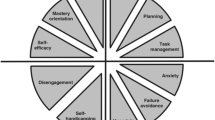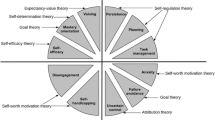Abstract
This article is a report on a longitudinal case study that investigated the problem of lowered engagement with mathematics and students’ perspectives of the factors that influenced their engagement during the middle years of schooling. The article provides a synthesis of the entire study and a summary of its findings. In order to address the research question a group of 20 students from within the same school cohort participated in the study spanning three school years from their final year of primary school, to their second year of secondary school. Data was collected through interviews, focus group discussions, and classroom observations. A major finding of this study was that positive pedagogical relationships between teachers and their students must be developed as a foundation for sustained engagement.
Similar content being viewed by others
References
Attard, C. (2010). Students’ experiences of mathematics during the transition from primary to secondary school. Paper presented at the 33rd annual conference of the Mathematics Education Research Group of Australasia, Fremantle, Perth.
Attard, C. (2011a). Engagement with mathematics: the influence of teachers. Southeast Asian Mathematics Education Journal, 1(1), 31–39.
Attard, C. (2011b). “My favourite subject is maths. For some reason no-one really agrees with me”: student perspectives of mathematics teaching and learning in the upper primary classroom. Mathematics Education Research Journal, 23(3), 363–377.
Attard, C. (2012). The influence of pedagogy on student engagement with mathematics during the middle years of schooling. In A. L. White & U. H. Cheah (Eds.), Transforming school mathematics education in the 21st century (pp. 140–157). Penang: SEAMEO RECSAM.
Australian Association of Mathematics Teachers. (2006). Standards of excellence in teaching mathematics in Australian schools. Adelaide: Australian Association of Mathematics Teachers.
Australian Curriculum Assessment and Reporting Authority (ACARA). (2010). The shape of the australian curriculum version 2.0. Sydney: ACARA.
Bahr, N. (2010). The middle years learner. In D. Pendergast & N. Bahr (Eds.), Teaching middle years: Rethinking curriculum, pedagogy and assessment (2nd ed., pp. 48–64). Crows Nest: Allen & Unwin.
Boaler, J. (2000). Mathematics from another world: traditional communities and the alienation of learners. Journal of Mathematical Behavior, 18(4), 379–397.
Boaler, J. (2009). The elephant in the classroom: Helping children learn and love maths. London: Souvenir Press Ltd.
Boaler, J., Wiliam, D., & Brown, M. (2000). Students’ experiences of ability grouping: disaffection, polarisation and the construction of failure. British Educational Research Journal, 26(5), 631–649.
Board, A. C. (2009). Shape of the Australian curriculum: Mathematics. Canberra: Commonwealth of Australia.
Carrington, V. (2006). Rethinking the middle years: Early adolescents, schooling and digital culture. Crows Nest: Allen & Unwin.
Clarke, D. (2009). Mathematics teaching and learning: where to? Learning Matters, 14(1), 3–8.
Collins, A., & Halverson, R. (2009). Rethinking education in the age of technology: The digital revolution and schooling in America. New York: Teachers College Press.
Commonwealth of Australia. (2008). National numeracy review report. Canberra: Human Capital Working Group, Council of Australian Governments.
Corbin, J., & Strauss, A. (2008). Basics of qualitative research: Techniques and procedures for developing grounded theory. Thousand Oaks: Sage Publications, Inc.
Creswell, J. W. (2007). Qualitative inquiry and research design (2nd ed.). Thousand Oaks: Sage Publications.
Douglas Willms, J., Friesen, S., & Milton, P. (2009). What did you do in school today? Toronto: Canadian Education Association.
Downer, J. T., Rimm-Kaufman, S. E., & Pianta, R. C. (2007). How do classroom conditions and children’s risk for school problems contribute to children’s behavioral engagement in learning? School Psychology Review, 36(3), 413–432.
Ewing, B. (2006). “Go to the page and work it from there” young people’s experiences of learning mathematics from a text. Australian Senior Mathematics Journal, 20(1), 8–14.
Fair Go Team NSW Department of Education and Training. (2006). School is for me: pathways to student engagement. Sydney: NSW Department of Education and Training.
Fredricks, J. A., Blumenfeld, P. C., & Paris, A. H. (2004). School engagement: potential of the concept, state of the evidence. Review of Educational Research, 74(1), 59–110.
Goos, M., & Bennison, A. (2008). Surveying the technology landscape: teachers’ use of technology in secondary mathematics classrooms. Mathematics Education Research Journal, 20(3), 102–130.
Hattie, J., & Timperley, H. (2007). The power of feedback. Review of Educational Research, 77(1), 81–112.
Hayes, D., Mills, M., Christie, P., & Lingard, B. (2006). Teachers and schooling making a difference. Sydney: Allan & Unwin.
Hickey, D. T. (2003). Engaged participation versus marginal nonparticipation: a stridently sociocultural approach to achievement motivation. The Elementary School Journal, 103(4), 401–429.
Lowrie, T. (2004). Making mathematics meaningful, realistic and personalised: Changing the direction of relevance and applicability. Paper presented at the Mathematical Association of Victoria Annual Conference 2004: Towards Excellence in Mathematics. Clayton: Monash University.
Martin, A. J. (2008). Motivation and engagement Scale: High school (MES-HS) test user manual. Sydney: Lifelong Achievement Group.
Martin, A. J., Marsh, H. W., McInerney, D. M., & Green, J. (2009). Young people’s interpersonal relationships and academic and nonacademic outcomes: Scoping the relative salience of teachers, parents, same-sex peers, and opposite-sex peers. Teachers College Record, March 2009. Retrieved from http://www.tcrecord.org/Home.asp.
McGee, C., Ward, R., Gibbons, J., & Harlow, A. (2003). Transition to secondary school: A literature review. New Zealand: Ministry of Education.
Merriam, S. B. (2009). Qualitative research: A guide to design and implementation. San Francisco: Wiley.
Munns, G. (2007). A sense of wonder: pedagogies to engage students who live in poverty. International Journal of Inclusive Education, 11(3), 301–315.
Munns, G., & Martin, A. J. (2005). It’s all about MeE: A motivation and engagement framework. Paper presented at the Australian Association for Academic Research Focus Conference, Cairns. http://www.aare.edu.au/05pap/mun05400.pdf.
NSW Department of Education and Training. (2003). Quality teaching in NSW public schools. Sydney: Professional Support and Curriculum Directorate.
O’Toole, T., & Plummer, C. (2004). Social interaction: a vehicle for building meaning. Australian Primary Mathematics Classroom, 9(4), 39–42.
Pierce, R., & Ball, L. (2009). Perceptions that may affect teachers’ intention to use technology in secondary mathematics classes. Educational Studies in Mathematics, 71(3), 299–317.
Ricks, T. E. (2009). Mathematics is motivating. The Mathematics Educator, 19(2), 2–9.
Ryan, A. M. (2000). Peer groups as a context for the socialisation of adolescents’ motivation, engagement and achievement in school. Educational Psychologist, 25(2), 101–111.
State of Victoria Department of Education and Training (2004). Middle years of schooling overview of Victorian Research 1998–2004 Retrieved July 7, 2005, from http://www.sofweb.vic.edu.au/mys/docs/research/
Stevens, L. P., Hunter, L., Pendergast, D., Carrington, V., Bahr, N., Kapitzke, C., et al. (2007). Reconceptualizing the possible narratives of adolescence. The Australian Educational Researcher, 34(2), 107–128.
Sullivan, P., & McDonough, A. (2007, July). Eliciting positive student motivation for learning mathematics. Paper presented at the Mathematics: Essential Research, Essential Practice: 30th Annual Conference of the Mathematics Education Research Group of Australasia, Hobart, Tasmania.
Sullivan, P., Mousley, J., & Zevenbergen, R. (2005). Increasing access to mathematical thinking. The Australian Mathematical Society Gazette, 32(2), 105–109.
Thomas, M., & Chinnappan, M. (2008). Teaching and learning with technology: Realising the potential. In H. Forgasz, A. Barkatsas, A. Bishop, B. Clarke, S. Keast, W. Seah, P. Sullivan, & S. Willis (Eds.), Research in mathematics education in Australasia 2004–2007: New directions in mathematics and science education (pp. 165–194). Rotterdam: Sense Publishers.
van den Heuvel-Panhuizen, M. (2008). Learning from “didactikids”: an impetus for revisiting the empty number line. Mathematics Education Research Journal, 20(3), 6–31.
Venkatakrishnan, H., & Wiliam, D. (2003). Tracking and mixed-ability grouping in secondary school mathematics classrooms: a case study. British Educational Research Journal, 29(2), 189–204.
Author information
Authors and Affiliations
Corresponding author
Rights and permissions
About this article
Cite this article
Attard, C. “If I had to pick any subject, it wouldn’t be maths”: foundations for engagement with mathematics during the middle years. Math Ed Res J 25, 569–587 (2013). https://doi.org/10.1007/s13394-013-0081-8
Received:
Revised:
Accepted:
Published:
Issue Date:
DOI: https://doi.org/10.1007/s13394-013-0081-8




